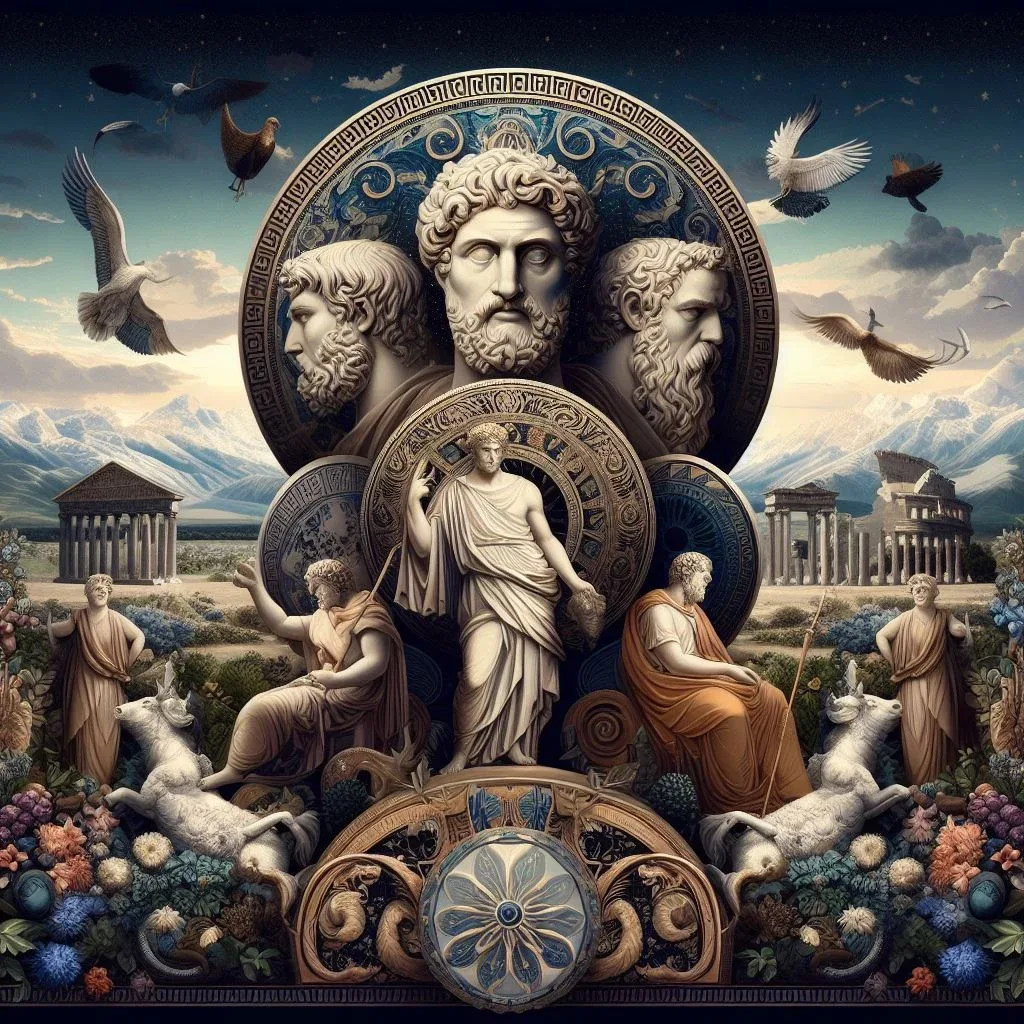Stoicism, one of the most influential philosophical schools of antiquity, shaped the way many understand ethics, wisdom, and the pursuit of virtue. Among the great names who stood out in this field, Marcus Aurelius stands out as a philosopher emperor who not only ruled the Roman Empire, but also practiced and promoted the principles of Stoicism in his life and leadership. In this blog post, we will delve deeply into the life and teachings of Marcus Aurelius, exploring his crucial role in the development of Stoicism and his lasting impact.

Who was Marcus Aurelius?
Emperor and Philosopher
Marcus Aurelius Antoninus, born in 121 AD, was Roman emperor from 161 until his death in 180 AD. He is often remembered as the last of the “Five Good Emperors” of Rome, known for their stable and wise rule. But what distinguished him from other emperors was his passion for stoic philosophy.
Educated by Great Philosophers
From a young age, Marcus Aurelius was influenced by Stoic philosophers such as Junius Rusticus and Apollonius of Claudius. His most notable mentor was the Stoic philosopher Quinto Junio Rustico, who introduced him to teachings and practices of Stoicism. It was under Rustico's guidance that Marcus Aurelius delved deeper into Stoic philosophy and began to incorporate its principles into his daily life.
Marcus Aurelius and Stoicism

Personal Writings
Marcus Aurelius's greatest contribution to Stoicism is his series of personal writings known as “Meditations” (or “Thoughts” in some translations). These writings, which are a collection of reflections and notes made throughout his life, reveal his devotion to Stoic philosophy. In “Meditations”, he explores themes such as the pursuit of virtue, acceptance of what is beyond our control and constant self-examination.
Acceptance of Duty
One of the fundamental principles of Stoicism is the acceptance of duty. Marcus Aurelius believed that, as emperor, he had a moral duty to serve the common good and rule with wisdom and justice. He saw his role as a service to humanity and an opportunity to apply Stoic principles to his governance.
Control of Emotions
Marco Aurélio also emphasized the control of emotions as a fundamental aspect of Stoicism. He understood that emotions can cloud judgment and lead to impulsive actions. Therefore, he practiced emotional self-discipline and self-control to make thoughtful and ethical decisions.
The Principles of Stoicism by Marcus Aurelius

Living According to Nature
One of Marcus Aurelius' central teachings was to live in accordance with nature. He believed that everything that happens in life, whether good or bad, is part of the natural order of the universe. Therefore, accepting circumstances as part of that plan was essential to finding serenity and inner peace.
The Quest for Virtue
The pursuit of virtue was a cornerstone of Stoicism by Marcus Aurelius. He saw the virtue as the only truly good thing and encouraged his followers to cultivate qualities such as courage, justice, wisdom and self-discipline. The continuous search for virtue was, for him, the essence of good living.
Constant Self-Examination
Marco Aurélio believed that constant self-examination was essential for personal growth. He wrote in his “Meditations” about the importance of reflecting on your own thoughts and actions, identifying areas in which you could improve and grow as an individual.
The Legacy of Marcus Aurelius in Stoicism

Influence on Philosophy
The impact of Marcus Aurelius on Stoic philosophy is undeniable. His “Meditations” continue to be studied and admired by philosophers, scholars and Stoic enthusiasts around the world. His profound reflections and tireless pursuit of virtue inspire those who seek guidance in philosophy.
Application in Modern Life
The teachings of Marcus Aurelius also find resonance in modern life. His advice on self-examination, emotional self-control and the pursuit of virtue are frequent themes in self-help books, motivational talks and cognitive behavioral therapy.
Conclusion: Marcus Aurelius – Emperor and Stoic Philosopher
Marcus Aurelius, the philosopher emperor, played a significant role in promoting and practice of Stoicism. His dedication to the pursuit of virtue, constant self-examination, and service to humanity has inspired generations and continues to light the path for those seeking an ethical and meaningful life.
This blog post explored in depth the life and teachings of Marcus Aurelius, highlighting his crucial role in the development of Stoicism and his lasting impact on philosophy and everyday life.




